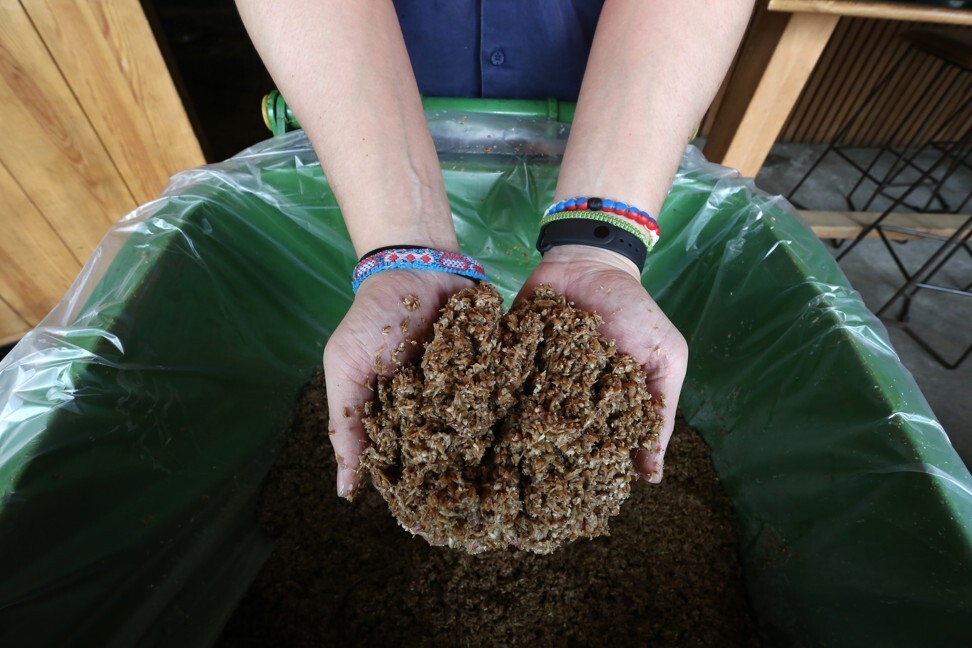
Group turning food waste into compost wants to cut down on landfill and make Hong Kong more self-sufficient
- Three friends who founded Hong Kong Community Composting want to reduce the more than 3,500 tonnes of food waste the city send to landfills every day
- For HK$110 (US$14) a month, subscribers can deposit their leftovers in special bins, which is collected and turned into compost and biogas

Boris Yeung, a brewer at Little Creatures Brewing in Hong Kong’s Kennedy Town, points to a large metal tank where malt barley is boiled to convert its starch into fermentable sugar.
“For every brew we use about 100kg to 150kg [220lb to 330lb] of malt barley and depending on the beer style we use different kinds of malt. We used to just throw the spent grain into the bin and it would go into the landfill,” Yeung says.
But since last summer the microbrewery has been sending the discarded grain to Hong Kong Community Composting (HKCC), even though it costs money.
Yeung became more environmentally conscious after living in Seattle for eight years and he wanted to make sure the refuse did not go straight into Hong Kong’s fast-filling landfills.

Cities around the world are grappling with mounting foodstuff waste and some, including San Francisco and Seoul, have introduced mandatory composting and recycling laws for all residences and businesses.
In Hong Kong, 3,565 tonnes of food waste, the largest component of all municipal solid waste, was dumped into landfills in the New Territories every day in 2018, according to local government statistics. That is 19 per cent higher than the 2,995 tonnes dumped every day in 2008.
Food waste in garbage bags breaks down very slowly in landfills because of a lack of oxygen. It is so slow that food often does not properly decompose after years or even decades in the ground. When sociologists excavated landfills in the US in the 1970s, they unearthed a dated serving of guacamole from 1967. It was reportedly almost as good as new.
Concerned about the environment and understanding the difficulties of home composting, three friends – Renée Mullen, an applied microbiologist; Paige Tantillo, a permaculture designer; and Ming Chan, a data scientist – joined forces and co-founded HKCC, which began operations last year offering a service for environmentally minded Hongkongers concerned about their food waste.
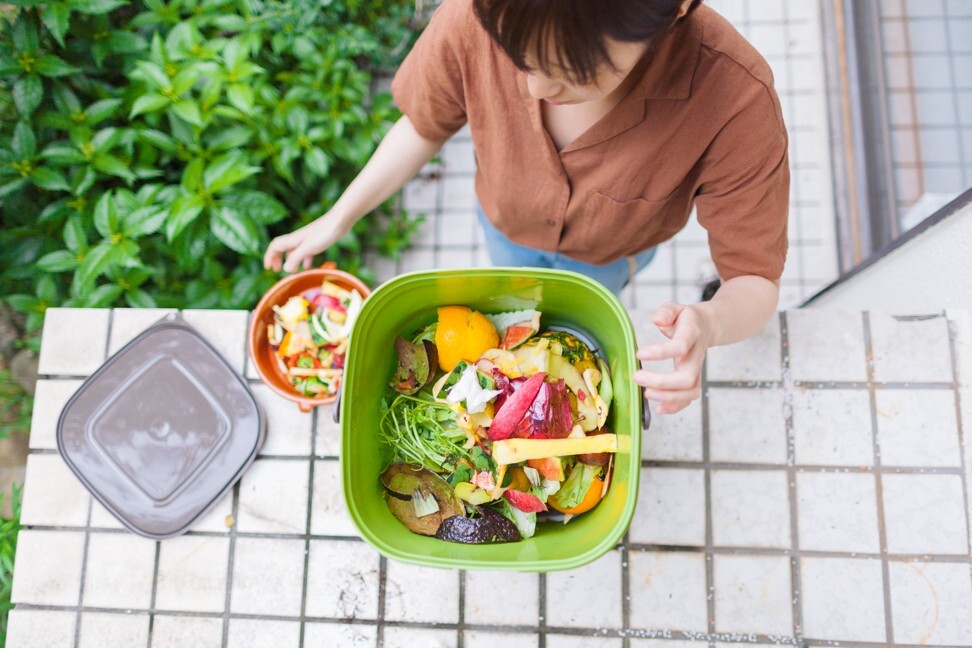
HKCC now has six bins around Hong Kong: four in residential areas, one at Little Creatures Brewing and one at a school canteen in Ho Man Tin. Subscribers can sign up on the organisation’s website, pay a HK$30 set-up fee and then dump their food waste in one of the 180-litre bins, which can be unlocked using an app. The cost of the service is HK$110 (US$14) per month for residential subscribers and includes a free pack of compostable bin liners. The fees for businesses vary depending on their location and the amount of food waste.
Yeung is one of around 120 subscribers and he sends 700kg to 900kg of grain for composting each month. He is contemplating also sending food scraps from the microbrewery’s kitchen in future.
“I think it would be great if we can create this environmental circle where we use the grain, which goes into compost, to a farm, and maybe some farm produce would come to us,” he says.
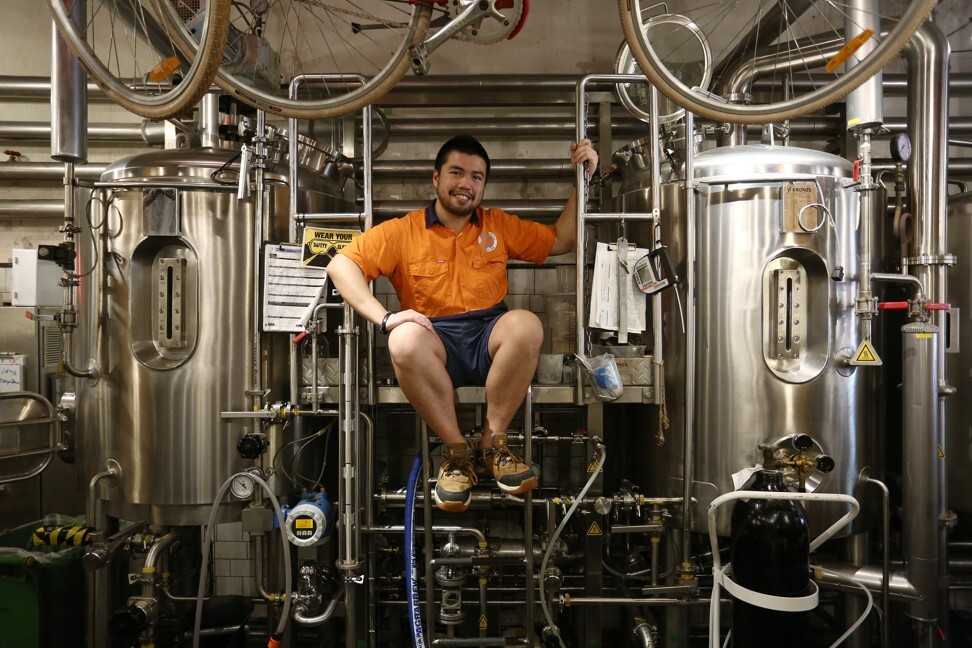
A total of about 500kg of waste is collected each week by a subcontractor working for HKCC. Yeung recalls a week when about 150kg of the brewery’s grain refuse was not collected so he contacted the co-founders. He was surprised when they arrived to personally pick up the waste. They are very passionate about what they do, he says.
Last May, Rachel Lavery’s family of four subscribed to an HKCC compost bin located opposite the store Live Zero in Sai Ying Pun, a few minutes’ walk from their apartment building. To pay for the bin, before local schools closed, Lavery’s seven-year-old daughter Alessandra and her older sister Safiya would walk to school instead of taking the bus.
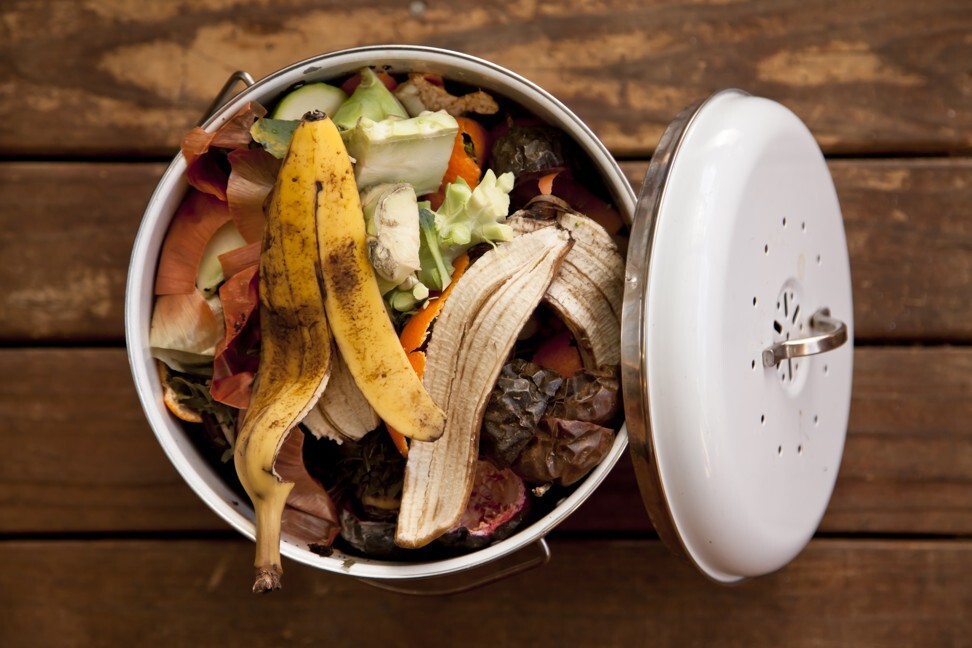
They have a bin in their kitchen with a lid to collect any compostable food, and it is emptied daily into a compostable bag, which they keep in the freezer. With this arrangement, explains Lavery, the waste “does not smell or attract insects”, and when the freezer is full, they take it to the composting bin.
Fruit and vegetable peelings, eggshells, and any uneaten food all go into the bin. To keep track of how much food waste they generate, they weigh it. “It is averaging about half a kilo per day,” says Lavery’s husband, Pete Gilham.
Lavery has noticed a benefit since they began composting: her kitchen bin does not fill up as quickly as it used to. “We had to empty it every day because it used to smell and attract insects.” Now, she says, they are clearing it out about once a week. Along with other recycling initiatives, the family is down to generating around 100g of waste a day.
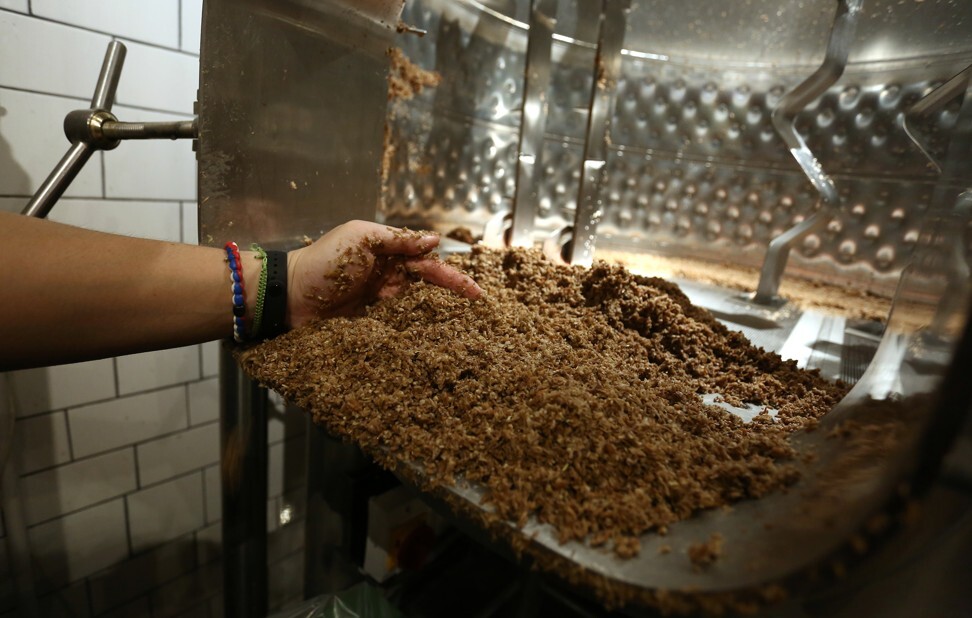
Composting can be done with or without oxygen. In the method that does use the gas, known as aerobic composting, there are four necessary ingredients, explains HKCC’s Tantillo. These include carbon-rich “browns” such as paper, cardboard and dead leaves; “greens”, which are nitrogen-rich and include vegetable and fruit scraps; moisture from green waste; and air (oxygen), which is added by turning the compost regularly.
The ratio of “browns” to “greens” should be at least three or four to one, Tantillo says. Sometimes compost bins emit a foul smell because there is not enough dry and carbon-based material, or it does not have enough oxygen, likely because it is too wet, Mullen says.
Mullen dispels some common composting myths. Disposable utensils and dishes that are made of polylactic acid (PLA), which is derived from renewable sources, are labelled as “compostable”, but it is difficult to distinguish between ordinary and PLA utensils. To break down, PLA needs “industrial aerobic composting that includes shredding and high temperatures; we do not have facilities in Hong Kong that use high temperatures”, the microbiologist says.
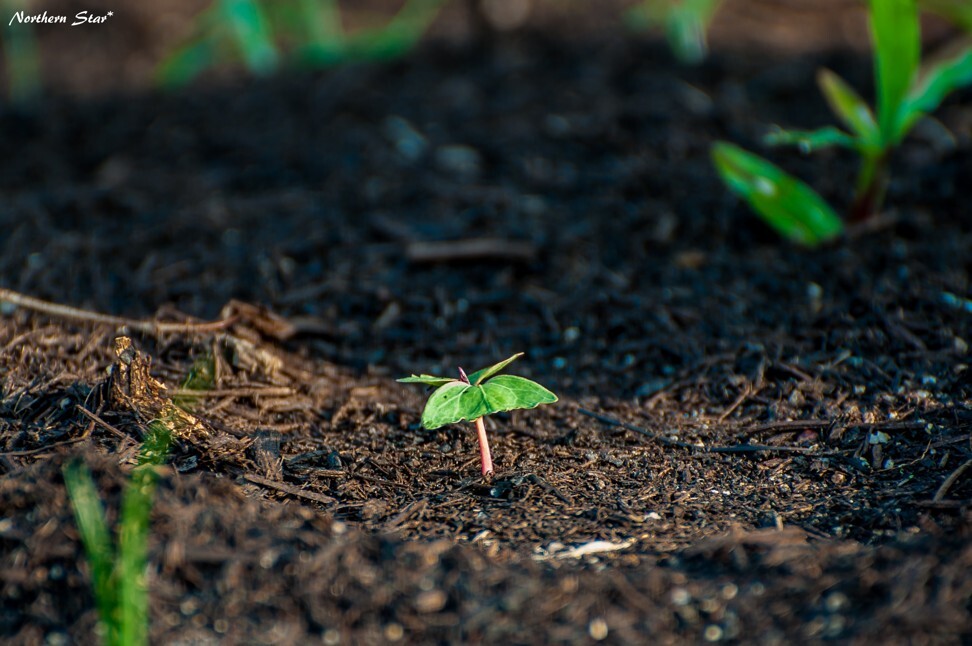
Compost is primarily used in farming, which is of increasing interest to Hongkongers. Local households spent a total of HK$5.8 billion on organic food in 2015 – HK$1.4 billion more than in 2012, according to a survey by the Hong Kong Organic Resource Centre at Baptist University. The centre manages the Hong Kong Organic Resource Centre, which certified 132 organic farms in 2019, compared with 61 in 2009.
Chen Wen-ning, a Hong Kong-based consultant on thermal composting and regenerative farming, ran experimental plots in Kam Tin, in the rural New Territories, to test the effects of using compost. She found that the use of good quality compost results in a host of benefits: fewer pests and insects, more soil microbes, longer flowering and fruiting periods, and reduced need for ordinary organic fertilisers, among others.
“Organic Resource Centre [ORC]-certified farmers find it hard to locate quality compost that can meet the ORC requirement locally,” Chen says.
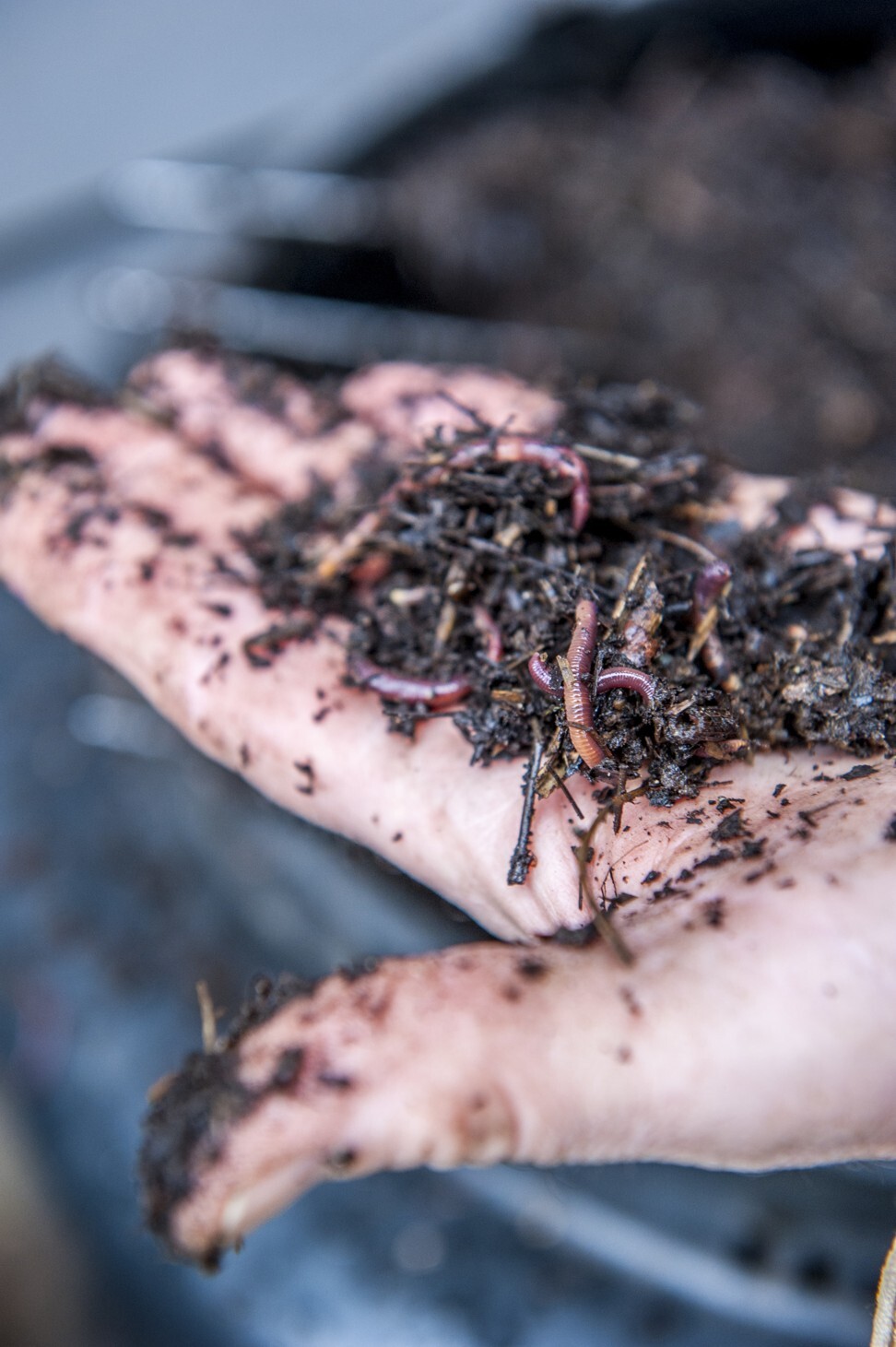
Although the coronavirus crisis sweeping the world has upended ordinary life, HKCC does not intend to suspend operations, Mullen says.
“Our plans have not changed, although we are experiencing people leaving Hong Kong and cancelling their membership,” she adds. “We’ve had a few people say they can no longer afford any extra expenses, but on the other hand we have new subscribers too.”
HKCC is registered as a limited company because that was the fastest way to get the service going, the founders say, adding that they do not expect to make a profit.
HKCC recently started sending waste to O-Park1, the government’s first waste-to-energy facility, located in north Lantau Island, where commercial and industrial food waste is converted into biogas for electricity and residues are used for compost.
Some people believe that composting isn’t worth it because Hong Kong does not have much of a market for it, Mullen says. She adds, however, that the daughter of a Fanling-based farming couple told her that the family had seen a growing push for local, organic produce over the past few years because there has been increased demand in the city.
“Maybe Hong Kong could shoot for becoming at least a little more self-sufficient food-wise,” says Mullen. “With so little land, it’s important to nurture the soils and to practise regenerative farming so that soils can ensure plants provide good food. Adding good quality compost can help.”